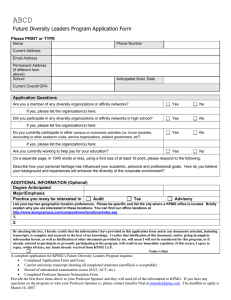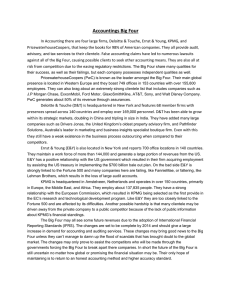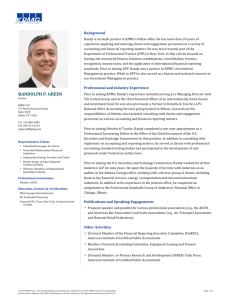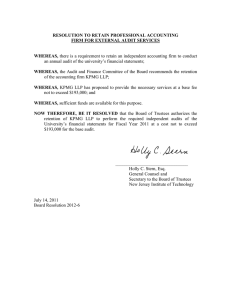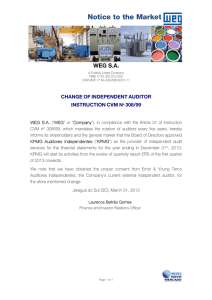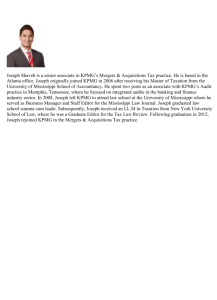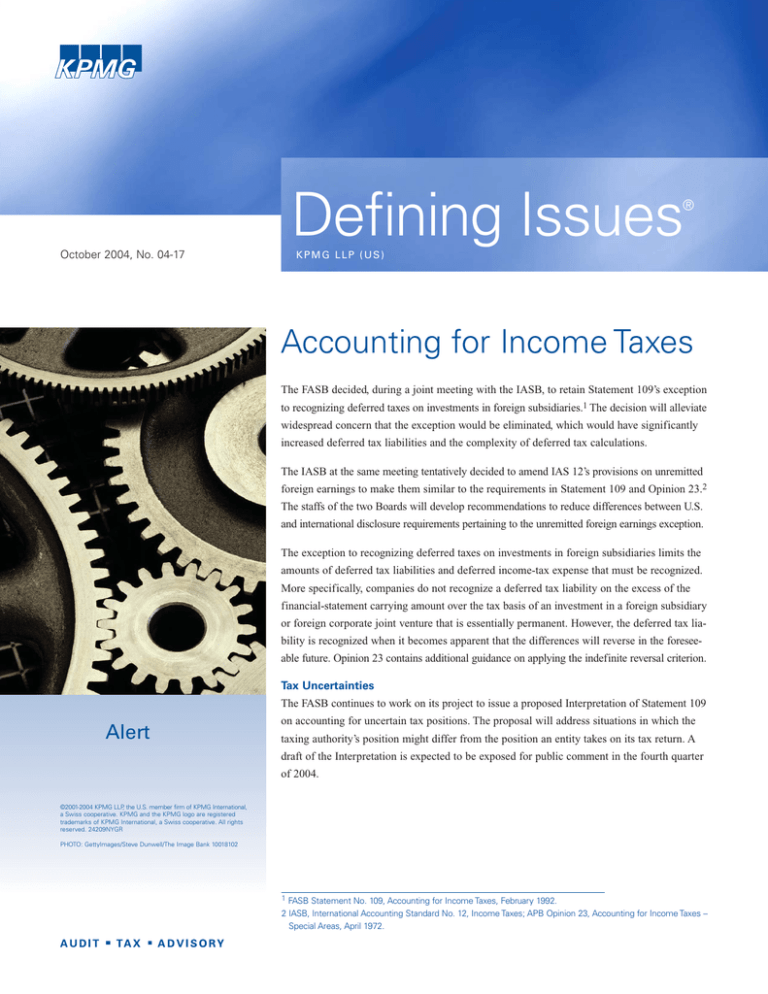
Defining Issues
®
October 2004, No. 04-17
KPMG LLP (US)
Accounting for Income Taxes
The FASB decided, during a joint meeting with the IASB, to retain Statement 109’s exception
to recognizing deferred taxes on investments in foreign subsidiaries.1 The decision will alleviate
widespread concern that the exception would be eliminated, which would have significantly
increased deferred tax liabilities and the complexity of deferred tax calculations.
The IASB at the same meeting tentatively decided to amend IAS 12’s provisions on unremitted
foreign earnings to make them similar to the requirements in Statement 109 and Opinion 23.2
The staffs of the two Boards will develop recommendations to reduce differences between U.S.
and international disclosure requirements pertaining to the unremitted foreign earnings exception.
The exception to recognizing deferred taxes on investments in foreign subsidiaries limits the
amounts of deferred tax liabilities and deferred income-tax expense that must be recognized.
More specifically, companies do not recognize a deferred tax liability on the excess of the
financial-statement carrying amount over the tax basis of an investment in a foreign subsidiary
or foreign corporate joint venture that is essentially permanent. However, the deferred tax liability is recognized when it becomes apparent that the differences will reverse in the foreseeable future. Opinion 23 contains additional guidance on applying the indefinite reversal criterion.
Tax Uncertainties
The FASB continues to work on its project to issue a proposed Interpretation of Statement 109
Alert
on accounting for uncertain tax positions. The proposal will address situations in which the
taxing authority’s position might differ from the position an entity takes on its tax return. A
draft of the Interpretation is expected to be exposed for public comment in the fourth quarter
of 2004.
©2001-2004 KPMG LLP, the U.S. member firm of KPMG International,
a Swiss cooperative. KPMG and the KPMG logo are registered
trademarks of KPMG International, a Swiss cooperative. All rights
reserved. 24209NYGR
PHOTO: GettyImages/Steve Dunwell/The Image Bank 10018102
1 FASB Statement No. 109, Accounting for Income Taxes, February 1992.
2 IASB, International Accounting Standard No. 12, Income Taxes; APB Opinion 23, Accounting for Income Taxes –
Special Areas, April 1972.
New Tax Law
Corporate accounting for income taxes will be affected by the American Jobs Creation Act of
2004, signed into law today by President Bush. The new law allows domestic entities to repatriate foreign earnings at a reduced rate, subject to certain limitations. The law’s incentive to
repatriate foreign earnings will affect evaluations of whether some or all of those earnings
qualify for Statement 109’s exception from recognizing deferred tax liabilities. Companies with
foreign operations will need to evaluate how the change in the tax law affects whether some
or all of their foreign earnings will be indefinitely reinvested in the foreign tax jurisdiction.
Other provisions of the new tax law could also affect financial-statement tax expense. For
example, the law repeals an export tax benefit for U.S.-based manufacturing activities and
grants a special deduction that, depending on the circumstances, could reduce the effective tax
rate. We understand that the FASB plans to issue a Staff Position to address whether the tax
effect of the special deduction should be recognized only as amounts are deducted on the tax
return or treated as a change in tax rates with adjustments to deferred tax assets and liabilities.
The descriptive and summary statements in this presentation are not intended to substitute
for the text of what the FASB or IASB might ultimately adopt as accounting requirements or
for the text of the American Jobs Creation Act of 2004. Reporting entities complying with
any FASB or IASB requirements and with tax legislation should apply the texts of the adopted
final requirements and law, consider their particular circumstances, and consult their accounting and legal advisors.
This is a publication of KPMG’s
Department of Professional
Practice—Audit and Risk Advisory
(212) 909-5600
Contributing authors:
Darryl S. Briley
Robert P. Nardone
John R. Lambert
Earlier editions are available at:
www.kpmg.com and
www.aro.kpmg.com
Defining Issues® is a registered trademark of KPMG LLP. © 20012004 KPMG LLP, the U.S. member firm of KPMG International, a
Swiss cooperative. KPMG and the KPMG logo are registered trademarks of KPMG International, a Swiss cooperative. All rights
reserved. 24209NYGR

